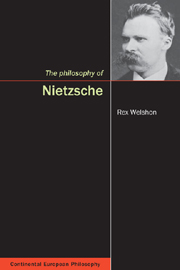1 - Morality
Summary
Morality is that branch of philosophy that studies what is good and what is right. It immediately divides into two sub-disciplines: meta-ethics and normative ethics. Meta-ethics is concerned with analysing moral concepts and claims, and normative ethics is concerned with identifying and explaining moral values. Nietzsche is primarily concerned with meta-ethical issues, although some of his most amazing claims against morality are directed to substantive, normative claims of morality. Nietzsche is probably the most trenchant critic of morality in the philosophical tradition (the only close competitor is the French existentialist Jean-Paul Sartre). The following passage from Twilight of the Idols is entirely representative of his assessment of morality: “Moral judgment belongs, as does religious judgment, to a level of ignorance at which even the concept of the real, the distinction between the real and imaginary is lacking” (TI VII 1). Nietzsche has no truck with any moral views that precede his own, except in so far as they are exemplars of wrong-headedness, stupidity, blindness and viciousness. He thinks that every moral system hitherto developed is hopelessly naive, as in the case of English utilitarianism, a boneheaded misreading of human psychology, as in the case of Stoicism, malicious slavery, as in the case of Christianity, or foggy and grey, as in the case of Kant.
For those of us who are steadfast in our adherence to universalizable moral codes, reading Nietzsche can be a brutally disruptive experience, as we find cherished assumptions repeatedly laid on the table and smashed to bits.
- Type
- Chapter
- Information
- The Philosophy of Nietzsche , pp. 15 - 36Publisher: Acumen PublishingPrint publication year: 2004

